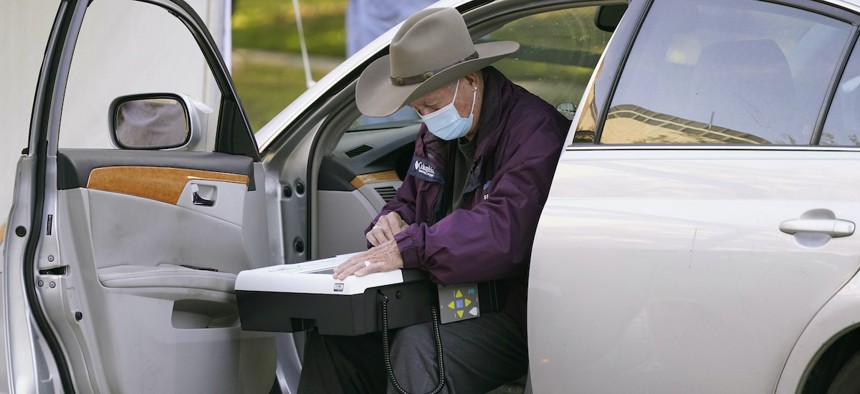Texas Can Limit Counties to a Single Ballot Drop-off Location, Appeals Court Rules

An elderly voter uses the drive-thru option to vote from his car outside Richardson City Hall during early voting Tuesday, Oct. 13, 2020, in Richardson, Texas. (AP Photo/LM Otero) Associated Press

Connecting state and local government leaders
The 5th U.S. Circuit Court of Appeals on Monday ruled that Texas can mandate only one drop-off location for absentee ballots in each county, reversing a lower court ruling on Gov. Greg Abbott's order earlier this month.
Texas is allowed to restrict local counties to providing just one location for voters to drop off mail-in ballots, a federal court ruled late Monday in a decision that is a blow to advocacy groups that had sought to overturn an order earlier this month by Gov. Greg Abbott.
The decision, issued by the 5th U.S. Circuit Court of Appeals, reverses a lower court ruling issued Friday.
“Leaving the Governor’s October 1 Proclamation in place still gives Texas absentee voters many ways to cast their ballots in the November 3 election. These methods for remote voting outstrip what Texas law previously permitted in a pre-Covid world,” U.S. Circuit Judge Kyle Duncan wrote for the three-judge panel, all appointees of President Trump. “The October 1 Proclamation abridges no one’s right to vote.”
The proclamation limiting counties to a single ballot drop-off site was signed by Abbott after several large counties—all Democratic strongholds—provided multiple sites for voters to drop off their ballots ahead of the Nov. 3 general election. Abbott, a Republican who in July extended the state’s early voting period, said in a statement that the measure was necessary to “strengthen ballot security protocols throughout the state,” but has not elaborated publicly on how reducing the number of ballot drop-off sites would accomplish that goal.
In court filings, Texas Attorney General Ken Paxton claimed that some of the counties that had opened multiple drop-off locations would not provide “adequate election security, including poll watchers.” Those “inconsistencies,” he wrote, “introduced a risk to ballot integrity, such as by increasing the possibility of ballot harvesting.”
But local leaders have complained that the restriction is unfair and will force voters to make long drives to drop off a ballot, especially in Texas' large urban counties. For example, Harris County, where Houston is located, encompasses about 1,700 square miles. Officials there had planned to open 12 drop-off locations for absentee ballots.
Voting rights advocates and election officials said the extra sites were necessary to help residents vote safely during the pandemic, particularly amid concerns about mail delays as the U.S. Postal Service grapples with an unprecedented number of absentee ballots.
Texas limits who can vote by mail or by dropping off an absentee ballot. Unlike many other states, this type of voting is restricted to people older than 65, people with disabilities or an illness and those out of the county during the election.
Conservative leaders across the country have frequently expressed concerns about ballot security amid a crush of mail-in voting during the Covid-19 pandemic. There is no evidence that voting by mail leads to increased election fraud, but the court ruled that Abbott does not have to provide any to clarify the need for his proclamation.
“Such evidence has never been required to justify a state’s prophylactic measures to decrease occasions for vote fraud or to increase the uniformity and predictability of election administration,” the opinion says.
Civil rights groups, including the Campaign Legal Center, the League of United Latin American Citizens and the League of Women Voters of Texas, filed multiple lawsuits against Abbott’s proclamation, noting that the rule change during an election that is already underway would disproportionately affect low-income voters, voters of color and disabled voters without access to reliable transportation. A federal judge on Friday sided with those groups and blocked the proclamation from taking effect. Monday’s decision overturns that action.
“This is clearly a setback for Texas voters,” Domino Garcia, national president of the League of United Latin American Citizens, said in a statement. “The ruling should send a strong message that voter suppression is allowed even when it threatens all Texans and our nation’s democracy. It is offensive to every reasonable American to allow a politician the power to stifle lawful votes and essentially rig the outcome to an election, especially during a pandemic.”
The decision was issued the same day that the Texas Republican Party filed a lawsuit against Harris County Clerk of Court Chris Hollins, saying the 10 sites with "drive-thru" voting he had set up across the county were in violation of state law. These sites were established for people afraid of getting the coronavirus at traditional polling places, Hollins has said.
Kate Elizabeth Queram is a staff correspondent for Route Fifty and is based in Washington, D.C.

NEXT STORY: Route Fifty Pulse Check: Mayor Vi Lyles




